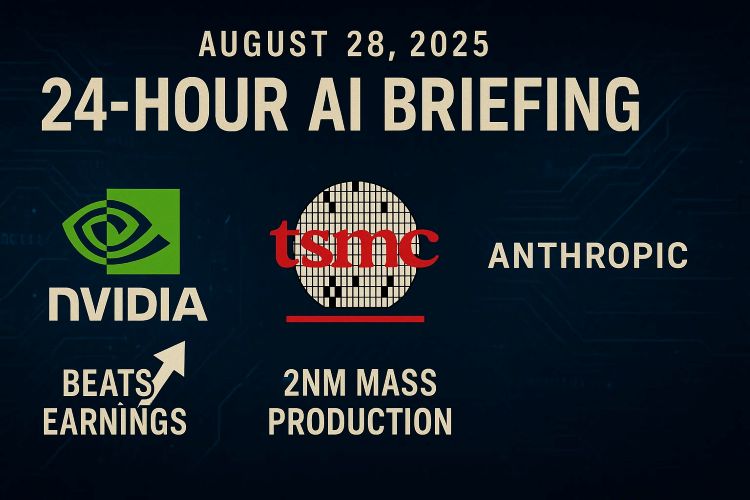AI Navigation
- articleAI Trends
- lightbulb_2AI Tips
- assistant_navigationAI Navigation
- heatHot Articles
- emergency_heat_2Hot Tips
- format_list_numberedPrompt Formatter
- psychologyTest Center(RPI)
August 28, 2025 · 24-Hour AI Briefing: NVIDIA Beats Earnings, TSMC’s 2nm Mass Production, Anthropic’s National Security Push
In the past 24 hours, the AI industry has seen a series of significant developments: NVIDIA delivers an impressive earnings report, TSMC announces plans for 2nm mass production, and Anthropic takes a bold step into national security AI. These milestones reflect accelerating innovation in chips, computing power, and strategic AI applications, shaping the next phase of global competition.

1. NVIDIA Q2 Earnings Beat Expectations, But Blackwell’s Entry Into China Remains Uncertain
NVIDIA reported its Q2 results for fiscal year 2026, ending July 27, with revenue reaching $46.743 billion, up 56% year-over-year, exceeding the market’s expectation of $46.1 billion. Net income came in at $26.422 billion, a 59% YoY increase.
For Q3, NVIDIA projects revenue of $54 billion, plus or minus 2%, excluding H20 chip sales in China. The guidance midpoint falls slightly below market expectations of $53.1 billion. Additionally, the company repurchased $9.7 billion in stock during the quarter. CEO Jensen Huang said there’s a “realistic possibility” that Blackwell chips could enter the Chinese market.
Comment: NVIDIA’s Q2 results were extremely strong, with both revenue and net profit beating expectations. The Q3 guidance highlights robust global demand for AI computing power. Despite geopolitical tensions and export restrictions, NVIDIA’s ability to identify new growth regions showcases its resilience. The $9.7 billion stock buyback signals management’s confidence in the company’s future. However, uncertainty remains around the timeline for introducing Blackwell chips into China, and the risk of an AI investment bubble cannot be overlooked.
2. TSMC to Begin 2nm Mass Production in Q4, Apple Secures Nearly Half of Initial Capacity
TSMC plans to begin mass production of its 2nm (N2) process technology in Q4 2025, with wafer prices reaching as high as $30,000 each. Apple has secured nearly half of the initial capacity and is expected to use the A20 chip built on TSMC’s cutting-edge N2 process for its iPhone 18 series. Other major customers for the 2nm technology include Qualcomm, AMD, MediaTek, and Broadcom.
Comment: TSMC’s N2 process adopts gate-all-around (GAA) nanosheet transistors, improving transistor density by 15% compared to its 3nm (N3) node, delivering 15% higher performance at the same power or 24%-35% lower power consumption. Current yield rates have reached an impressive 90%. Apple’s move to lock in nearly 50% of early capacity ensures a significant performance advantage for the iPhone 18. As TSMC’s largest customer, Apple’s massive orders provide stability for N2 production. Meanwhile, Qualcomm, AMD, MediaTek, and Broadcom joining the first wave highlights the surging demand for AI, high-performance computing, and advanced smartphones. However, at $30,000 per wafer, this cutting-edge technology remains out of reach for many startups.
3. Anthropic Forms National Security AI Advisory Board, Deepens Ties with U.S. Government
AI startup Anthropic announced the formation of its National Security & Public Sector Advisory Board to support U.S. government applications of artificial intelligence. The board will help identify high-impact AI use cases, expand capabilities across defense, intelligence, energy, and justice, and foster stronger public-private partnerships while supporting the creation of industry-leading standards.
Comment: The board includes heavyweight figures such as former Senator Roy Blunt and former CIA Deputy Director David S. Cohen, underscoring Anthropic’s ambitions in national security AI. This move demonstrates the growing convergence of AI, government, and geopolitics, as nations compete to secure leadership in next-generation technology. Anthropic’s deepening collaboration with the U.S. government positions it at the center of this global AI race. Meanwhile, rivals like Google and OpenAI are also aggressively partnering with governments, setting the stage for intense competition over AI’s role in national security.
For more cutting-edge AI updates, business insights, and tech trends, visit:
https://iaiseek.com
To explore more major developments in the past 72 hours, read:
August 27, 2025 · 24-Hour AI Briefing: AI Inference Demand Surge, IBM-AMD Quantum Alliance, MongoDB Earnings Boom